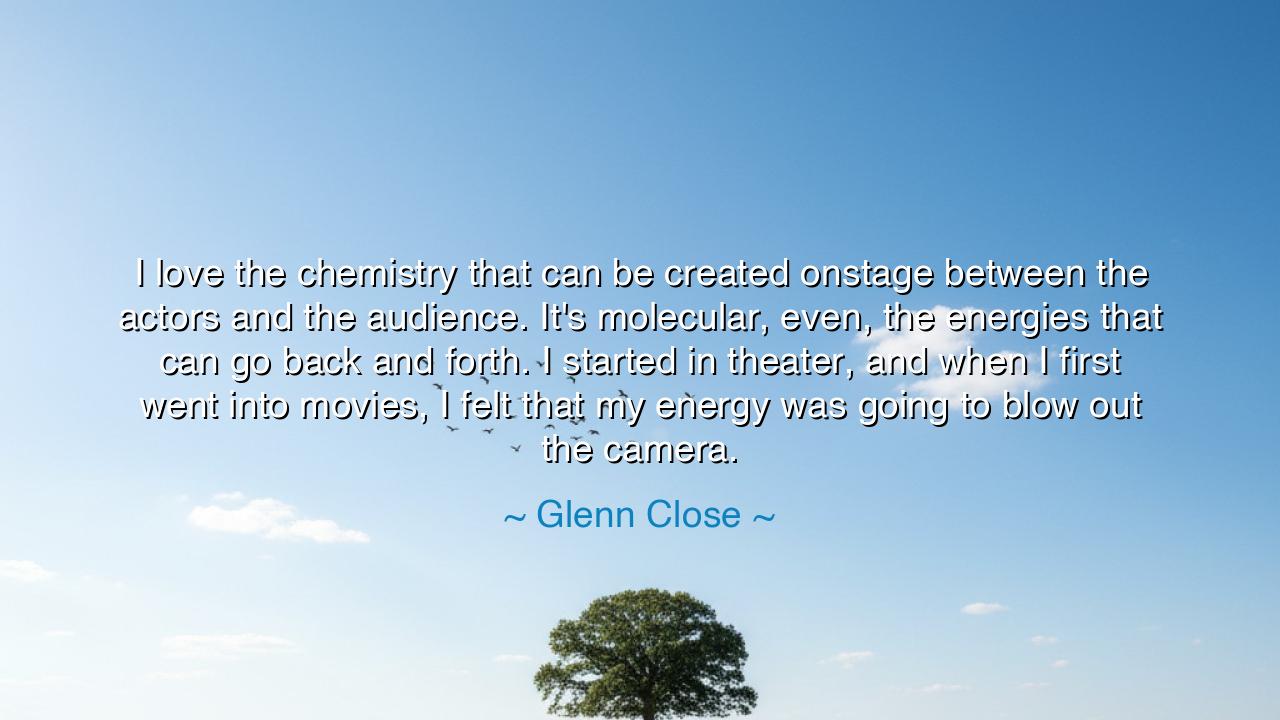
I love the chemistry that can be created onstage between the
I love the chemistry that can be created onstage between the actors and the audience. It's molecular, even, the energies that can go back and forth. I started in theater, and when I first went into movies, I felt that my energy was going to blow out the camera.






Gather close, O seekers of truth and wisdom, for I bring to you a profound lesson about the very essence of creation and connection. The words of the great actress Glenn Close echo through time: "I love the chemistry that can be created onstage between the actors and the audience. It's molecular, even, the energies that can go back and forth. I started in theater, and when I first went into movies, I felt that my energy was going to blow out the camera." In these words, she reveals the delicate, powerful relationship between the artist and their audience, a bond that is both mysterious and transformative.
To perform on the stage is to engage in a sacred exchange of energy. In the theater, the actors and the audience are bound together in a dance of emotion, thought, and spirit. This chemistry is not merely metaphorical, but molecular, as Close so vividly describes. The energy that flows between them is palpable, like the very forces of nature itself. It is a communion of souls, a moment where both the performer and the audience transcend their individual selves and become part of something greater. The actors give their energy freely, and in return, the audience feeds the actors’ performance, creating a cycle of mutual exchange that elevates both. The theater is a living entity, a space where time and space are suspended, and all that exists is the powerful connection between performer and spectator.
Consider the ancient Greek playwrights who understood this deep connection between actor and audience. The theater of Sophocles, Aeschylus, and Euripides was not simply a space for entertainment but a place for the soul to encounter itself. The audience, gathered in the grand amphitheaters, would sit as one body, feeling the collective weight of the drama unfold before them. The actors, in turn, would perform with such passion and conviction that the very air seemed to shimmer with the intensity of the exchange. The power of theater lies in this dynamic, in the shared experience between the performer and the onlookers. This is what Close refers to as the molecular energy—an invisible force that binds the artist and the audience in a moment of profound transformation.
Yet, as Close reflects, this chemistry does not always translate seamlessly to the medium of film. In cinema, the camera becomes the observer, the lens an intermediary that captures the actor’s energy in a more controlled and finite manner. In theater, an actor’s energy is uncontained, reaching out to every corner of the space, where it is met by the energy of the audience. But in film, that same energy must be focused, compressed, and channeled through the lens. Close, having moved from the theater to the screen, experienced this difference firsthand. Her energy, once free to roam and interact with the live audience, now had to be restrained to fit within the confines of the camera's gaze. Yet even within these confines, there is still power—though more intimate, more contained—just as a river flowing through a narrow channel can still carry immense force.
Consider the legendary Laurence Olivier, who, like Close, began his career in the theater and later embraced the art of film. Olivier’s performances on stage were known for their magnetic energy—he commanded the audience’s attention with the sheer force of his presence. Yet, when he transitioned to film, he too struggled with the difference in the energy exchange. On stage, he was one with the audience, his emotions and actions reflected back at him by the crowd. But in film, he had to adjust his performance, calibrating his energy to work within the constraints of the camera’s focus. This transition between the live stage and the still camera is a universal challenge for many actors—one that requires deep understanding and adaptation.
What lesson can we draw from Close’s words? The lesson is one of connection, energy, and adaptation. As we move through life, we too must learn to adapt our energy to the spaces we inhabit. There are times when we must give freely, pouring ourselves into the world with passion and spirit, much like an actor on the stage. And there are times when we must channel our energy more intimately, focusing our power for the task at hand. Just as the actor learns to balance their energy between stage and screen, so too must we learn to navigate the different demands of our own lives, adjusting our approach to suit the situation.
In your own endeavors, remember that energy is a precious force. Just as Glenn Close captures the essence of performance, so too must you understand the exchange of energy in all aspects of your life. Whether in work, relationships, or art, connection is key. Give freely of your energy, but also learn to channel it with focus when needed. The key is not just to perform for the world, but to understand how your energy flows, and how it can be shaped to create something meaningful. In this understanding, you will find the true power of creation—a power that transcends the individual and connects you to the world around you.






AAdministratorAdministrator
Welcome, honored guests. Please leave a comment, we will respond soon